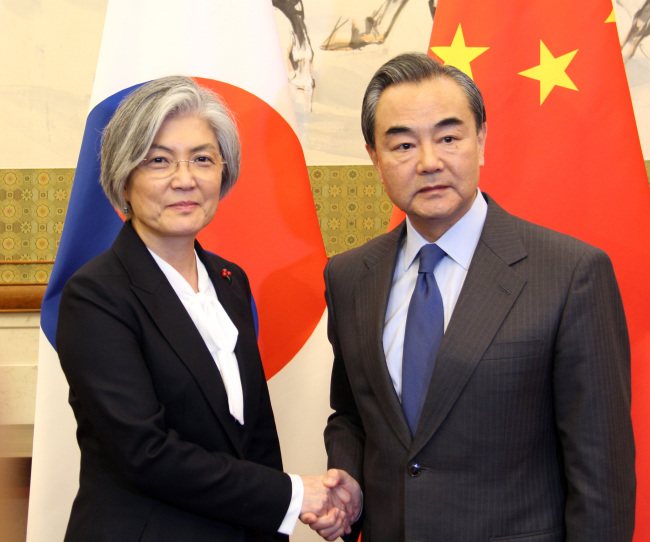Despite the much-publicized deal to patch up ties, there still seems to be a “gap in understanding” between South Korea and China over the issue of a US advanced missile defense system deployed here, a Seoul’s senior foreign ministry official said on Friday.
The official, who was present at a Wednesday meeting between South Korea’s Foreign Ministry Kang Kyung-hwa and her Chinese counterpart Wang Yi, said Beijing officials seemed to feel that they “gave up too much” to settle the dispute over Terminal High Altitude Area Defense system.
In the agreement reached last month, the two sides agreed to talk through military channels about the THAAD dispute, despite no apparent shift in their position. China reiterated its opposition on THAAD, saying the system’s powerful X-band radar could look deep into its territory, while Seoul insisted the system was for defense only. The military talks are yet to be scheduled, Seoul’s defense ministry said Friday.
“I think that China feels burdened to act as if nothing happened,” the official told reporters, requesting anonymity. “It is apparent that there is a gap in the way the THAAD is perceived between the South Korea and China authorities. We acknowledged the gap.”

South Korea`s Foreign Minister Kang Kyung-hwa shakes hands with his Chinese counterpart Wang Yi. Yonhap
China’s ultimate goal, the official went on, is to have South Korea withdraw the THAAD battery, currently up and running in Seongju, consisting six interceptor launchers and a radar.
But South Korea’s stance is it would not pull back THAAD unless the missile and nuclear threats from North Korea are resolved, the official added. Seoul has asserted that the missile shield is solely aimed at North Korea, not a third country such as China and Russia.
“We made it clear that the THAAD deployment was a sovereign decision, only aimed to deal with North Korea and no other country,” the official said.
The remarks came amid Beijing’s apparent attempt to pressure Seoul to uphold what they called the “three nos”: no additional THAAD deployments in South Korea; no participation in a US-led strategic missile defense system; and no creation of a trilateral military alliance with the US and Japan.
In an editorial published Friday, the Global Times of China said, “If South Korea failed to honor (three no-policies) promises, the relations between China and Korea would drop to the lowest point and it will deal a critical blow to bilateral trust.”
During the aforementioned meeting between two foreign ministers, China’s Yi pointed out that the two countries had agreed to resolve the THAAD dispute “in a step-by-step manner.”
“China attaches great importance that the (South Korea’s) deployment of the THAAD system will not damage China’s security interests,” Yi said in his opening remarks. “We hope the South Korean side will continue to appropriately handle the matter,” he said.
His remarks raised speculation here that China may make demands to South Korea such as measures to prevent the surveillance of its territory with THAAD radar or stop any further deployment of the system.
The presidential office Cheong Wa Dae on Friday sought to contain such speculation, saying Wang’s “step-by-step manner” does not indicate a change in tone from Seoul’s official agreement with Beijing that they would move forward from past disputes over THAAD and restore exchanges.
“We believe there is no shift from the two leaders’ positions that the agreement is about wrapping up THAAD disputes,” a Cheong Wa Dae official told the reporters under the condition of customary anonymity Friday.
“There could be many conversations going back and forth between South Korean and the Chinese officials. But it was more like a tug-of-war between the diplomats. Our position is that we shouldn’t view them as an indication of change to the agreement. The Chinese government agrees with that.”
The official also denied media reports that China had asked South Korea to install a wall to block the THAAD radar. Installed in the southern city of Seongju, the radar is suspected to have a range of up to 2,000 kilometers.
President Moon Jae-in, during his visit to Southeast Asia last week, said South Korea and China have yet to resolve the THAAD controversy completely, describing it as being “sealed.”
By Yeo Jun-suk (
jasonyeo@heraldcorp.com)






